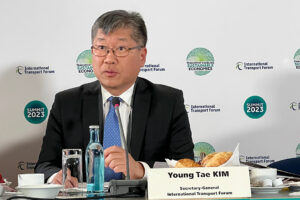




January Economic Update: Growth slows, prices rise
 DOWNLOAD
DOWNLOAD

Inflation Update: Up, up, and away?
 DOWNLOAD
DOWNLOAD

Quarterly Economic Growth Release: Growth takes on a slower pace
 DOWNLOAD
DOWNLOAD


Ambitious PHL policies needed to cut investment costs for low-carbon transportation, says lTF

LEIPZIG, Germany — The Philippines can reduce the cost of investment required for its core infrastructure to shift towards low- and zero-emission transportation if it starts to implement more ambitious policies, according to experts from the International Transport Forum (ITF).
“[This will] require a combination of complementary policies that successfully avoid unnecessary transport activity, shift more trips from fuel-burning to no-carbon transport, and improve the efficiency of transport generally,” said ITF Secretary-General Young Tae Kim during a briefing on Wednesday.
The core transport infrastructure, such as rail lines, roads, and ports, is needed to cater to future demand, according to the ITF’s latest global outlook report.
Implementing more ambitious policies now would lead to a decrease in average core infrastructure investment as a percentage of gross domestic product for Southeast Asian countries, including the Philippines, to around 1.7% from 1.8% between 2019 and 2050, the report said.
The ITF serves as a policy think tank for all modes of transport. It is an arm of the Organisation for Economic Co-operation and Development.
Measures in the current ambition scenario, according to the ITF, include policies or technological developments aimed at replacing internal combustion engine (ICE) vehicles, demand management and encouraging mode shift, investing in attractive and sustainable alternatives to private cars, and improving efficiency and operations to reduce carbon intensity.
“All transport decarbonization measures currently in place and already committed to will reduce global transport CO2 by only 3% by 2050,” the organization said in its report. “The transport sector would miss by a wide margin the reduction needed to keep climate change in check.”
If action to decarbonize transport is ratcheted up and accelerated, ITF said the transport sector can still reduce its carbon emissions by about 80% over the next 25 years compared to 2019.
“This drop would put transport on the right path for limiting the global temperature increase to ‘well below’ 2 degrees Celsius above pre-industrial levels, the goal of the Paris Climate Agreement,” it added.
The high-ambition scenario model proposed by the ITF includes targets to cease the sale of ICE vehicles for both passenger and freight road fleets, as well as the implementation of sustainable aviation fuel and the adoption of zero-emission fuel for maritime shipping.
“It will be absolutely essential to quickly scale up cost-competitive technologies and fuels to move people and goods with far, far fewer emissions. We can do all this if we take more decisive action now,” the ITF’s Mr. Kim said.
FREIGHT TRANSPORT STUDY
An ITF study on decarbonizing pathways for freight transport in the Philippines is set to be released in June, ITF Data and Policy Analytics team leader Guineng Chen told BusinessWorld.
He said that the study was conducted in response to the pandemic, which severely impacted global logistics, with the goal of providing policy recommendations to ensure the resilience of the Philippine freight transport sector in the future.
Sought for comment, transport expert Rene S. Santiago said in a Viber message: “Banning the sale of ICE vehicles will promote industries of the global north and make us import-dependent.”
“With our power supply heavily coal-dependent, that would give the facade of green — but in reality not be carbon neutral,” he added.
Mr. Santiago also noted that the Philippines is “many years away in realizing its public utility vehicle (PUV) modernization program, which is less ambitious than full transition to electric vehicles (EVs).”
For his part, Infrawatch PH convenor Terry L. Ridon said that while the country has a role in climate action, it does not have the same responsibility as developed economies to immediately implement measures to stem the warming of the planet.
“However, we should be able to implement climate strategies that can realistically be implemented today given the limitations of current Philippine economic growth,” he said in a Viber message.
He noted that EV adoption remains in its nascent stages, as the economic justification for the public to opt for such vehicles “does not yet exist, despite new government incentives to expedite the purchase of EVs.”
“There is also no certainty of a continuing supply of EVs into the country if ICE vehicle sales are ended, due to the fact that, unlike major economies, we do not produce our own electric vehicles,” he added.
He said that there may be broader prospects for EV adoption for PUVs, as the government may provide significant subsidies to help PUV operators to acquire new EVs.
“This is particularly relevant if the government includes emissions-free buses as part of its EDSA busway requirements,” Mr. Ridon added.
The Philippine government should also continuously engage with its foreign partners to study emerging technologies and practices in various sectors, he said.
According to the ITF, Transport Secretary Jaime J. Bautista has expressed interest in joining the organization, which will enable the Philippines to benefit from the policies and best practices of other member nations.
Only eight out of its 64 member countries are from Asia, including Cambodia, China, Japan, South Korea, and India. Last year, Cambodia became the first Southeast Asian country to join the ITF. – Arjay L. Balinbin, Multimedia Editor
This article originally appeared on bworldonline.com





 By BusinessWorld
By BusinessWorld